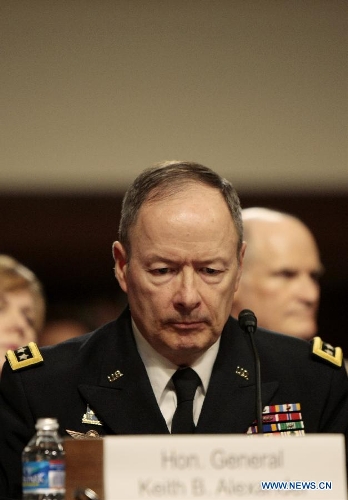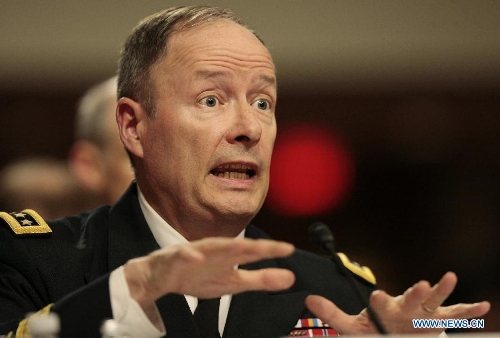China deserves explanation of PRISM
| Global Times | 2013-6-14 1:13:01 By Global Times |

US
Army Gen. Keith Alexander, commander of the US Cyber Command, director
of National Security Agency (NSA), testifies before a Senate
Appropriations Committee hearing in Washington D.C. on June 12, 2013.
(Xinhua/Fang Zhe)

US
Army Gen. Keith Alexander, commander of the US Cyber Command, director
of National Security Agency (NSA), testifies before a Senate
Appropriations Committee hearing in Washington D.C. on June 12, 2013.
(Xinhua/Fang Zhe)
Edward Snowden, the man who blew the whistle on the American National Security Agency's PRISM project, has claimed that the US has been hacking servers in the Chinese mainland and Hong Kong for years. The Chinese diplomatic department should explicitly demand a reasonable explanation from the US government.
Snowden has turned out to be a hot potato, posing a challenge for Beijing. Whether the Chinese government agrees to extradite Snowden back to the US will directly impact their bilateral relationship, which has seen a good start after the Xi-Obama meeting.
But a positive relationship should not prevent Beijing from being dynamic and fact-oriented when dealing with specific conflicts. Snowden's revelation about US cyber attacks on Hong Kong and mainland networks is closely related to Chinese national interests. The Chinese government should acquire more solid information from Snowden if he has it, and use it as evidence to negotiate with the US.
Such acts will not harm the Sino-American relationship, as one can assume that the US would do the same to China. This proves the flexibility of their bilateral relationship.
Snowden is a political offender against the US, but what he is doing benefits the world. His actions test, rather than disturb, the bilateral ties.
Public opinion will turn against China's central government and the Hong Kong SAR government if they choose to send him back.
Snowden's exposure has upgraded our understanding of cyberspace, especially cyber attacks from the US, which is probably a much sharper weapon than its traditional military force. This weapon has demonstrated the US' hypocrisy and arrogance. Besides Snowden's disclosure, it is still unknown what else the US, a country which once condemned China for cyber attacks, has done to China.
The US is accumulating all the advanced powers of the Internet to forge a state-level "fist" in order to launch cyber attacks on other countries. The unparalleled power of this "fist" is beyond our imagination, which should be an alarm bell for us to catch up with the development of the Internet. Our focus should be fixed on grasping the core technology of the Internet industry in the future.
Snowden is a "card" that China never expected. But China is neither adept at nor used to playing it. China should make sure that Hong Kong is not the last place where other "Snowdens" want to go. At the very least, Hong Kong should be an acceptable destination for them.
China is a rising power, and it deserves corresponding respect from the US. Such respect will allow Sino-American relations to be more healthy and reciprocal.
No comments:
Post a Comment